It seems we can’t find what you’re looking for. Perhaps searching can help.
Sign Up for newsletter!
Subscribe to get the latest eBook!
Hotline






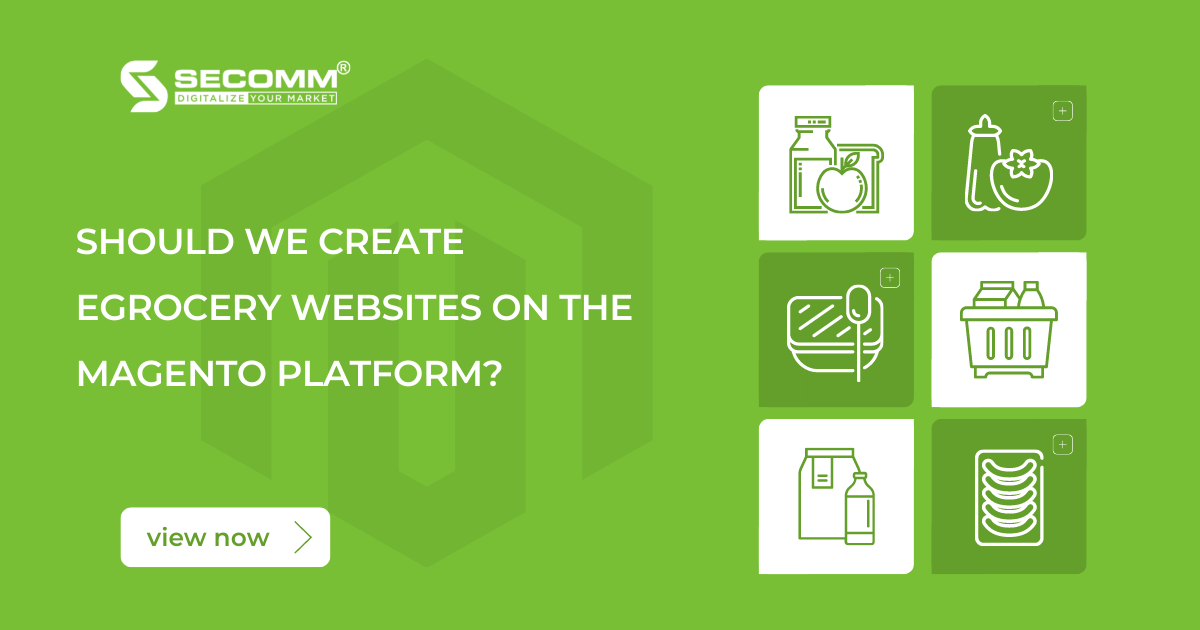
The growth of the grocery eCommerce industry in the Vietnamese market in 2021 is undeniable. According to the Google report, online grocery-related searches will increase by 223% in 2021, 3.6 times in June, and 11 times in July during Vietnam’s lockdown due to Covid-19 in several provinces.
Recognizing the market’s enormous potential, the need for a professional eCommerce website for online grocery businesses has grown significantly to expand the business system, supporting digital transformation and long-term revenue growth. Some of Vietnam’s largest grocery businesses, including Annam Gourmet Market, Bach Hoa Xanh, Organica, Farmer’s Market, and WinMart, have led the way in developing an eCommerce website system and have seen great success.
Choosing the right platform to build an eCommerce website makes the above brands successful. Platforms play a significant role in developing and operating an effective online grocery website. Along with well-known names such as Shopify, BigCommerce, and WooCommerce, Magento is considered the best online grocery support platform.
Businesses have many options when designing the eGrocery website interface on the Magento platform, including using available themes, customizing themes, and creating their own.
Businesses can find Magento-specific themes in the grocery field, developer community, or partner using available themes. It helps businesses reduce the cost of interface design, but it limits businesses’ brand positioning because the interface is easy to duplicate with other websites.

Businesses can save money and add brand identity elements such as colors, fonts, layout, and so on by customizing their themes. However, businesses need a team with extensive Magento expertise and experience to set up and customize the interface efficiently.
Businesses will have a one-of-a-kind website for their brand if they design their interface. However, it will require an enormous investment in development costs and a professional team.
When choosing Magento to develop an eCommerce website, most grocery stores often customize or use their themes to support an in-depth eCommerce business.
The Magento platform provides a comprehensive set of features, ranging from basic to advanced, for the development of professional eCommerce websites. Additionally, Magento allows you to create custom functions to solve specialized grocery industry problems.
Basic functions to assist businesses in running an efficient and smooth website system, such as
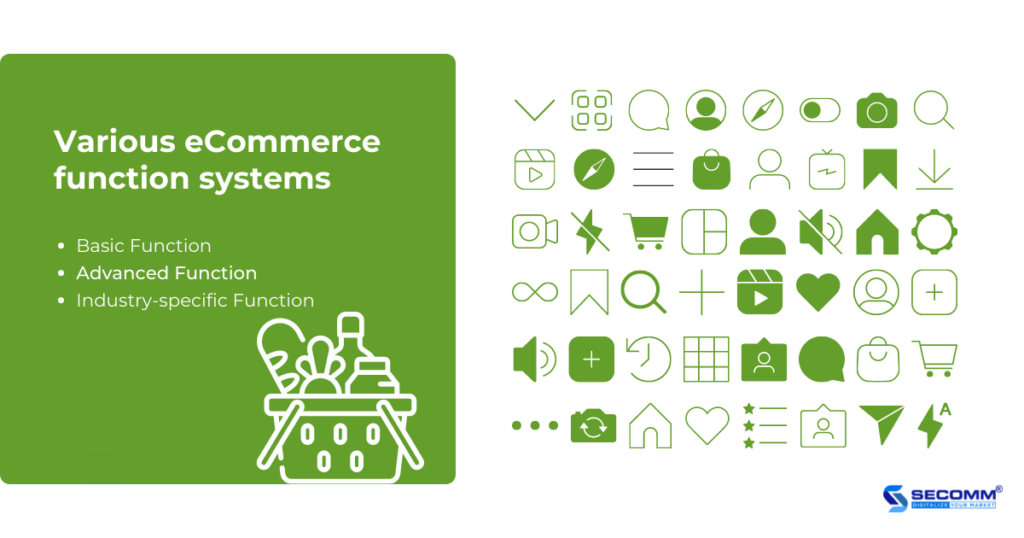
Advanced functions that improve consumers’ online shopping experiences, such as advanced search (Elasticsearch, live-search), MSI (Multi-Source Inventory), abandoned cart, similar product recommendations, PWA (Progressive Web Apps), multi-layered product catalog, and so on.
In addition, industry-specific functions assist businesses in dealing with their problems and reducing mistakes in the online grocery industry, such as order tracking, fast delivery, delivery time and location options, etc.
The high flexibility of Magento open source is an outstanding advantage that helps the system not only operate effectively at present but also expand the system to accompany businesses in the future.
Grocery businesses can fully integrate 3rd party services with Magento, making eCommerce operations efficient and smooth:
Marketing: Integrating with marketing software from Email Marketing (Mailchimp, Getresponse) to advertisement (Facebook, Google, Zalo, Tik Tok) to optimize eCommerce business
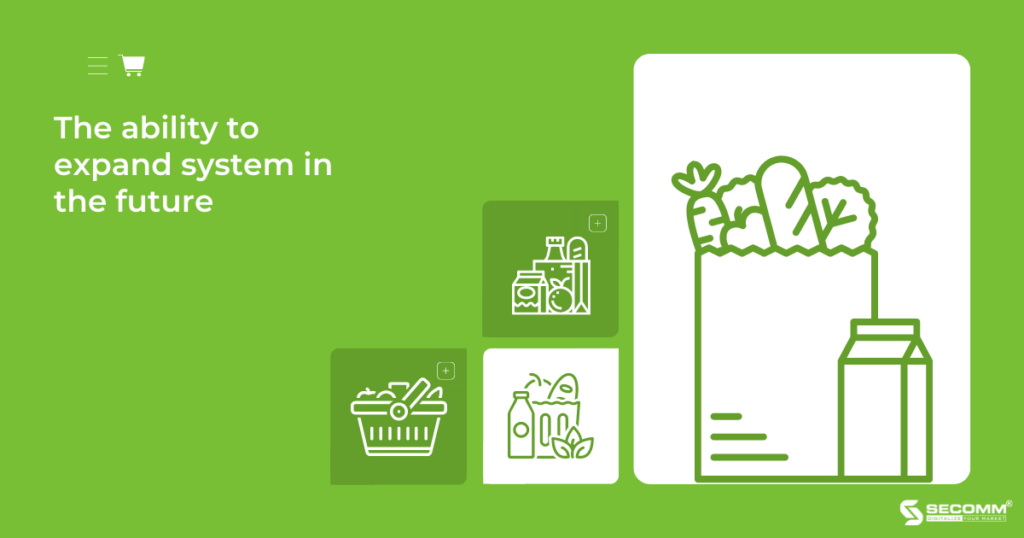
Besides that, Magento also allows businesses to expand from one website, and one store to many websites, and stores, and convert multi-language, and multi-currency flexibly while still being able to manage all data at the same time.
As a result, Magento is a suitable platform for a wide range of business models, including B2C, B2B, B2B2C, and O2O, as well as a wide range of business sizes, including new businesses entering the eCommerce market, startups, SMEs (small and medium enterprises), and large corporations.
In the path to building a website, security is another significant benefit that makes the Magento platform the preferred platform for online grocery stores.
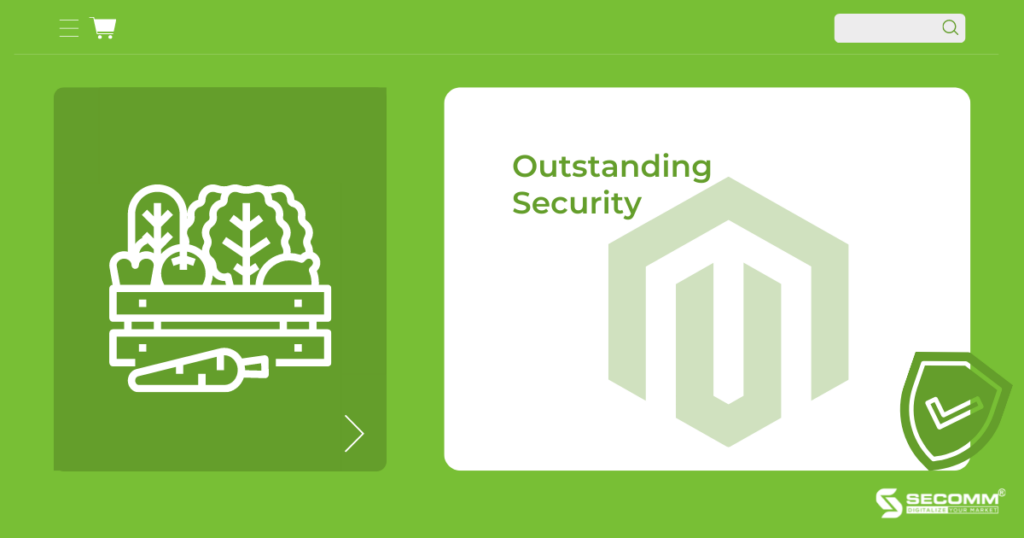
Magento includes a security scan tool that helps identify problems and propose security solutions to handle arising errors, effectively optimizing the security of grocery eCommerce websites. Moreover, to improve admin account security, Magento requires admins to use advanced passwords with at least 7 characters, including letters, numbers, and special symbols. Simultaneously, password complexity can be added to lowercase and uppercase passwords or re-login after a certain amount of login session time. Furthermore, Magento supports two-factor authentication, such as OTP or CAPTCHA code, to strengthen the security of the grocery eCommerce website system.
The Magento platform has a worldwide developer community that includes many experienced and professional Magento developers.
Magento is also part of the Adobe ecosystem, helping businesses easily access new technology trends and use Adobe’s available application store.
With such a strong development community, online grocery store businesses will receive the most assistance in resolving technical issues and consulting on building eCommerce solutions that are appropriate for their business model.
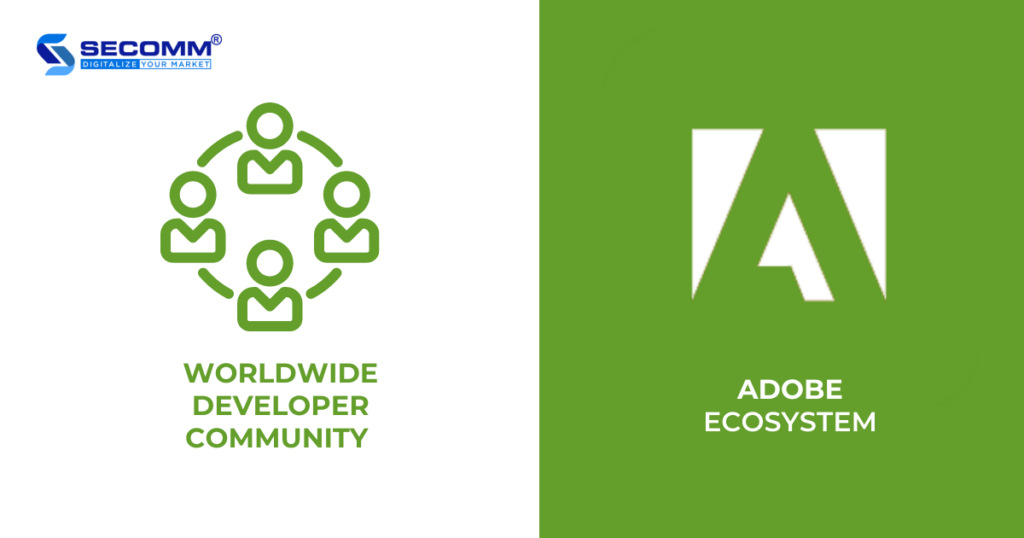
Although Magento is highly appreciated for its features and performance, the cost issue is still a significant obstacle that makes many eGrocery businesses hesitate to choose Magento.
Implementing a complete eCommerce website system built on Magento costs between $10,000 and $250,000.
| Cost | Magento Open Source | Magento Commerce | Magento Commerce Cloud |
| User licenses | Free | $22.000 -$125.000/yr | $40.000-$190.000/yr |
| Hosting | $100-$500/yr | $500-$6.500/yr | Free |
| Domain | $10-$400/yr | $10-$400/yr | $10-$400/yr |
| SSL Certificate | $50-$300/yr | $50-$300/yr | $50-$300/yr |
| Creating website | $5.000+ | $5.000+ | $5.000+ |
| Developing website | $1.800-$10.000/yr | $10.000+ | $10.000+ |
| Extensions | $60-$600/ea | 60-$600/ea | 60-$600/ea |
| Total | $10.000-$17.000 | $33.000-$149.000 | $50.000-$207.000 |
The table comparing Magento construction costs
A complete Magento project typically requires 3 to 6 months, with some projects requiring up to a year. As a result, businesses frequently waste time because of the complex functional system and the scarcity of Magento experts.
Businesses require a professional team with a deep understanding of Magento as well as practical experience on highly complex systems to implement an effective eGrocery website using Magento.
Although Annam Gourmet has previously owned a website, it is primarily used for brand development, and the effectiveness of eCommerce activities has not been prioritized. As a result, this website system is not comprehensive and is limited to crucial eCommerce functions. Furthermore, to transition into the “new normal”, Annam Gourmet must expand its online sales channel more intensively and effectively.
In order to meet the needs mentioned earlier, as well as to support the company’s long-term development goals in the Vietnamese market, Secomm and Synova successfully built a complete eCommerce website system on the Magento 2 platform.
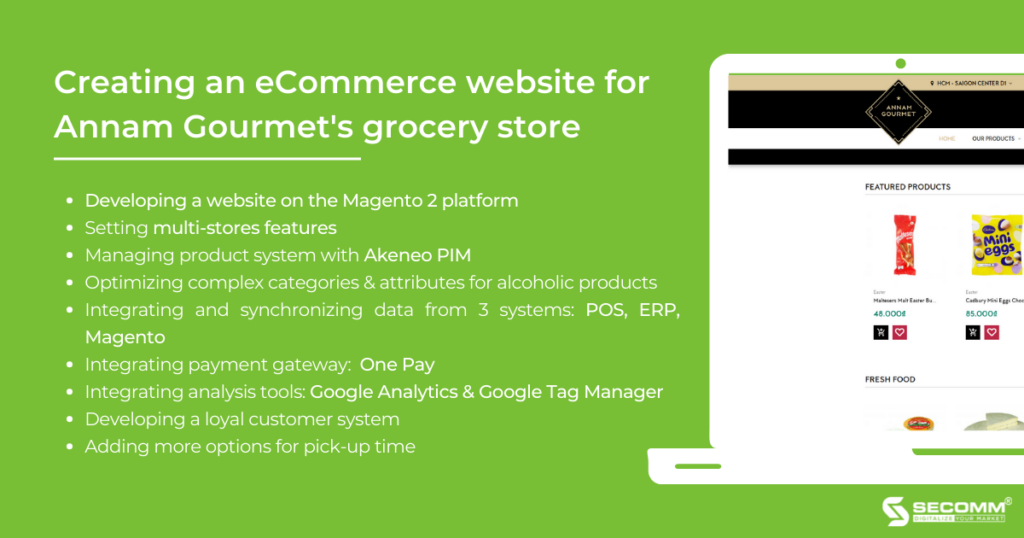
The Magento 2 website system is operationally stable and effective with other components in Annam Gourmet’s operating system. As a result, Annam Gourmet’s eCommerce website, with typical grocery industry elements, is capable of meeting all business needs, such as operating effectively in a highly complex system, quickly processing huge amounts of data about products, customers, and orders, and seamlessly syncing with ERP, CRM, POS, and so on.
In general, when building a grocery eCommerce website with Magento, businesses can master everything from interface design to feature system, leveraging a diverse ecosystem, a system capable of flexible customization, and superior security. On the other hand, businesses must prepare and invest in a budget, time, and team to successfully and effectively implement it.
Our company – SECOMM, has been partnering with many big enterprises such as An Nam Group (Vietnam), Jasnor (Australia), and Changi Airport Group (Singapore). As a result, we are aware of the challenges and worries firms face while developing an eCommerce website system.
Get in touch with us now for FREE eCommerce consultancy and solutions in eGrocery businesses.
 2
2
 4,205
4,205
 0
0
 1
1Subscribe to get the latest eBook!
Hotline